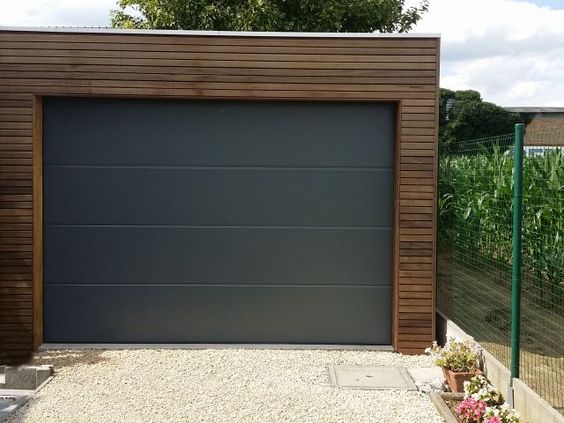As a homeowner who has been through the process of replacing my garage door, I understand the importance of making informed decisions to balance comfort, energy efficiency, and budget considerations. One of the key choices I had to make was whether to invest in an insulated garage door or opt for a non-insulated one.

By following Garage Door Repair, I’ll share my insights and research into the cost-effectiveness of insulated and non-insulated garage doors. By examining factors such as energy savings, long-term benefits, and upfront costs, we can determine which option is more economically advantageous for your home.
The Dilemma: Insulated or Non-Insulated Garage Door?
Before delving into the cost-effectiveness comparison, let’s understand the fundamental difference between insulated and non-insulated garage doors:
1. Insulated Garage Doors: These doors are designed with layers of insulation material, such as polyurethane or polystyrene foam, sandwiched between the door panels. Insulated doors offer improved energy efficiency and temperature regulation, making them ideal for homes where the garage is attached to the living space or in regions with extreme weather conditions.
2. Non-Insulated Garage Doors: Non-insulated doors typically consist of a single layer of steel or another material without any added insulation. While they are more affordable upfront, they provide minimal thermal resistance and may not be suitable for garages that require temperature control.
The Cost-Effectiveness Comparison
To determine which option is more cost-effective in the long run, we’ll examine several key factors:
1. Upfront Costs:
- Insulated Garage Door: Insulated garage doors generally have a higher initial cost due to the added insulation material and complexity of construction.
- Non-Insulated Garage Door: Non-insulated doors are more budget-friendly upfront, making them an attractive option for homeowners looking to save on initial expenses.
2. Energy Savings:
- Insulated Garage Door: Insulated doors offer significant energy savings by providing a barrier against temperature extremes. They prevent heat loss during the winter and keep the garage cooler in the summer, reducing the load on your heating and cooling systems.
- Non-Insulated Garage Door: Non-insulated doors provide minimal insulation and are less effective at regulating temperature. This may lead to higher energy bills as your HVAC system works harder to compensate for temperature fluctuations.
3. Comfort:
- Insulated Garage Door: Insulated doors create a more comfortable environment in your garage, especially if you use it for activities or as an extended living space. They help maintain a consistent temperature year-round.
- Non-Insulated Garage Door: Non-insulated doors may result in a garage that’s too hot in the summer and too cold in the winter, limiting its usability and comfort.
4. Durability:
- Insulated Garage Door: Insulated doors tend to be more durable and long-lasting due to their construction. The insulation also helps protect the door panels from temperature-related stress.
- Non-Insulated Garage Door: Non-insulated doors may be more susceptible to damage from extreme temperatures, potentially leading to earlier maintenance or replacement.
5. Resale Value:
- Insulated Garage Door: Homes with insulated garage doors often have a higher resale value because of their improved energy efficiency and comfort.
- Non-Insulated Garage Door: While non-insulated doors are functional, they may not offer the same resale value boost as insulated doors.
6. Climate Considerations:
- Insulated Garage Door: In regions with extreme temperature variations, insulated doors are more beneficial in maintaining a comfortable indoor temperature and reducing energy consumption.
- Non-Insulated Garage Door: Non-insulated doors may be suitable in mild climates where temperature control is less critical.
7. Maintenance Costs:
- Insulated Garage Door: Insulated doors typically require less maintenance due to their durability and protection against temperature-related wear and tear.
- Non-Insulated Garage Door: Non-insulated doors may require more frequent maintenance, including repainting and addressing issues caused by temperature extremes.
Making an Informed Decision
When it comes to deciding between an insulated and non-insulated garage door, here are some key considerations to help you make an informed choice:
1. Climate: Assess your local climate and the severity of temperature fluctuations. In extreme climates, such as areas with harsh winters and scorching summers, insulated garage doors offer a clear advantage in maintaining a comfortable temperature.
2. Long-Term Plans: Consider how long you plan to stay in your current home. If you intend to sell in the near future, an insulated garage door may enhance your home’s resale value.
3. Budget: Evaluate your budget and prioritize your immediate needs. While insulated doors offer long-term savings, non-insulated doors may be more budget-friendly upfront.
4. Usage: Think about how you use your garage. If it’s solely for parking vehicles and storage, a non-insulated door may suffice. However, if you use it as a workshop, gym, or additional living space, the comfort provided by an insulated door is invaluable.
5. Energy Efficiency: Calculate potential energy savings over time with an insulated garage door. This can help you determine the payback period for the initial investment.
6. Maintenance: Consider your willingness to invest time and money in maintenance. Non-insulated doors may require more frequent upkeep, impacting your overall cost of ownership.
Conclusion: Finding the Balance
In my quest to choose between an insulated and non-insulated garage door, I discovered that the decision hinges on a delicate balance between upfront costs and long-term benefits. While insulated garage doors may have a higher initial price tag, their energy efficiency, comfort, durability, and potential for higher resale value make them a cost-effective choice over time, especially in regions with extreme weather.
Ultimately, as stated in Garage Door Repair, the cost-effectiveness of your garage door choice depends on your specific circumstances, priorities, and budget. It’s essential to weigh the advantages and disadvantages of each option, consider your local climate, and assess your long-term plans for your home. By making a well-informed decision, you can strike the right balance between upfront expenses and long-term savings while ensuring a comfortable and energy-efficient garage space for years to come.
Keller Garage Door & Gate Repairs
1213 Hillside Dr, Keller, TX 76248, United States
817-769-3540